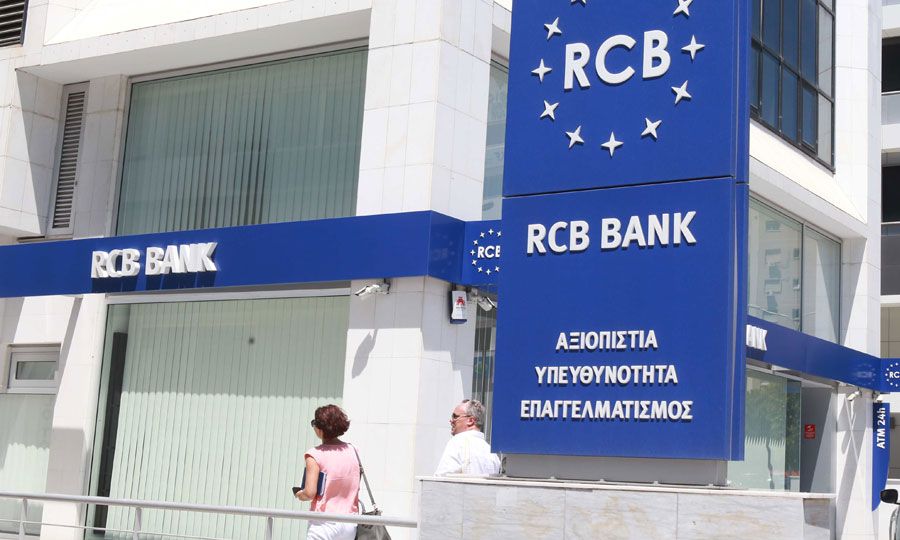Some 400 RCB employees and 11,000 customers are in limbo as the bank’s winding down process is not going as smoothly as the Central Bank had predicted.
RCB Bank had embarked on an “orderly winding down” of its Cyprus banking operations, as announced last month, transforming into an asset management company.
An unofficial briefing held by the Central Bank to the media said RCB’s winding down would be carried out orderly, without any issues for employees and clients alike.
According to banking sources, some 400 employees are uncertain about their future as they have not received an official update.
“RCB’s new business regime will not leave staff unscathed,” said a banking source noting that the institution’s winding down will end its banking operations with employees made redundant.
The winding down of banking operations means RCB can no longer accept deposits, loans or make investments.
Sources said RCB would evaluate its personnel needs and decide on the number of employees to keep on.
The only departments that appear safe are the staff handling accounts attached to assets and loans, a €2.9 bln portfolio that will remain under the management of RCB, and the credit card division.
RCB’s credit card services division challenged the banking clearinghouse JCC, and issuer, gaining a market share of over 10%.
A recent deal with Hellenic Bank to take over a €526 mln serviced loan portfolio also included the move of 16 employees who were managing the related accounts.
Difficult times
The remaining staff will stay until the completion of the process of returning all deposits to RCB customers.
No announcement has been made regarding the future of employees or a possible compensation agreement.
According to banking sources, RCB will have no choice other than to make the rest of its staff redundant.
RCB employees are not organised in any union, so they are not shielded by collective agreements.
Sources close to RCB told the Financial Mirror that the bank would honour redundancy clauses in each employee’s contract.
“RCB will also apply the provisions of Cyprus labour law,” said the source, adding that employees’ salaries match the pay scales of their colleagues at other banks.
Staff laid off will have a tough time as Cyprus’ banking and financial system is going through uncertainty, as banks promote digitisation of their operations to save on labour costs.
As told, 70% of RCB’s staff are Cypriots, while the bank also employs several Russians and a few Ukrainians permanently residing in Cyprus.
Clients unwelcome
Meanwhile, 11,000 RCB clients are faced with difficulties as other banking institutions are less than keen to accept them.
RCB clients were informed mid-week they could not top up their accounts and were told to withdraw their cash from the bank.
At the moment, customers can only use their accounts to withdraw cash or make online payments.
A quick survey conducted by the Financial Mirror found that Cyprus banks are reluctant to embrace RCB clients.
When contacted, Astrobank said that it required a minimum €10,000 deposit to open a new current account.
Eurobank said that new clients would have to find a whopping €30,000 to open an account.
Sources close to Cyprus’ two largest lenders, Bank of Cyprus and Hellenic, told the Financial Mirror that, although they do not require large deposits, they would prefer not to take on new clients.
“These days, banks don’t want to take in deposits at all.
“As the world economy started to emerge from lockdown, certain lenders are actively trying to drive down the deposit balances they built up over the Covid-19 pandemic,” a banking source said.
With low-interest rates, having excess liquidity is costly to Cyprus banks that have to deposit their overnight balances with the European Central Bank system.
Central Bank of Cyprus, sources told the Financial Mirror that local banks could not deny clients to open a basic debit account.
“A consumer can apply to a credit institution and request the opening of a payment account with basic characteristics, which offers a range of basic services that cover all the usual banking needs of an average consumer,” said the source.
Banks can refuse to open a current account with other benefits but cannot refuse to open an account with basic characteristics.
“It can only do so if the applicant has an account with another banking institution.
“In the case of RCB clients, they have been informed in writing that their accounts are being terminated, thus cannot be turned down by other banking institutions.”
Russia invasion
Russia’s sanctions warranted the transformation of RCB into an asset management company following Moscow’s invasion of Ukraine.
Initially, the bank tried to evade these sanctions by changing its shareholders, with VTB, a major state-owned Russian bank, a key shareholder at RCB transferring its shares to its Cypriot partners.
On February 24, the day Russia invaded Ukraine, RCB announced that VTB Bank sold its 46.3% stake to the bank’s Cypriot shareholders and management to protect itself from escalating geopolitical tensions.
However, international rating agencies did not take the change lightly, downgrading RCB’s rating and outlook.
According to banking industry sources, as one of the three systemic lenders in Cyprus, regulatory approval of RCB’s structure change by Europe’s Single Supervisory Mechanism would have taken “at least” 2-3 months.










